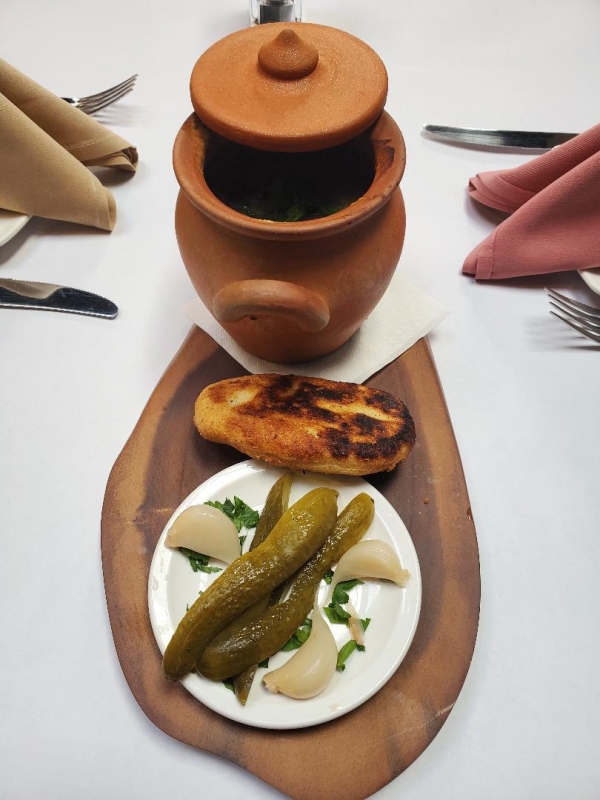Shalva Dzotsenidze wants to spread "supra" -- and Georgian food and culture more generally -- through Tamari, his new Georgian restaurant in San Carlos. Despite Georgian food and wine's rapid ascension in the U.S. in recent years, restaurants that serve Caucasus cuisine still remain few and far between in the Bay Area.

Tamari is now serving traditional Georgian fare in San Carlos. Photo courtesy Shalva Dzotsenidze.
Tamari is the region's second dedicated, sit-down Georgian restaurant, joining Bevri in downtown Palo Alto. (Kolkhida, a Georgian food truck in Mountain View, stopped operating last year to focus on catering and events.)
"There's no Georgian restaurant here except one in Palo Alto. When I asked people, 'Do you think we need another one?' People would tell me, 'Look, there are about 10 to 20 Italian restaurants in every town. Why can't we have at least one Georgian (restaurant) in every town?'" Dzotsenidze said.
Dzotsenidze, who's from Tbilisi, the capital of Georgia, opened Tamari at 1152 San Carlos Ave. in late February. He was a partner in the space's previous business, Greek restaurant Agora.
Dzotsenidze came to the United States through an exchange program in 1995. In Georgia, he said he faced persecution for his involvement in the anti-communist movement. He recalled widespread arrests of demonstrators in 1989, after which he fled to the mountains in Racha, where he and family members ran a farm and a small cafe.
"That was my first restaurant experience," he said.
Dzotsenidze, a Palo Alto resident, described Tamari as "authentic" and committed to quality. The restaurant prepares khinkali (meat- or cheese-filled dumplings) from scratch, makes fresh bread and sulguni, a brined Georgian cheese, in house and imports spices from Georgia that aren't available in the U.S. (Unfortunately, due to local health department regulations, the restaurant can't make bread in the traditional Georgian way — baking it in a tone, or a hot clay structure that's buried partway underground and requires an experienced baker to manage, Dzotsenidze said.)
In the style of "supra," the Tamari menu is split into cold and hot small plates, entrees, breads and sides (plus soups, salads and dumplings), all meant to be shared family-style.
Tamari serves six regional variations of khachapuri, including the well-known, boat-shaped and cheese-filled acharuli khachapuri, topped with an egg and pat of butter. There's also imeruli khachapuri, bread filled with a blend of four cheeses, including two that Dzotsenidze imports from Georgia and their own sulguni, as well as megruli khachapuri, which gets an extra layer of melted cheese on top after the bread is baked. "Imagine a pizza with extra cheese," Dzotsenidze said of megruli khachapuri.
Meanwhile, kubdari is filled with chopped beef, onion, cannabis seed paste and spices. Kubdari originated in a mountainous region where fewer vegetables grow, hence the meat filling, Dzotsenidze said.
Tamari also serves chakapuli, a traditional lamb or veal stew made with green plums, tarragon, herbs and spices; and shkmeruli, a Cornish game hen cooked in milk, garlic, herbs and spices in a traditional clay pot. It's served in said pot with fresh bread to soak up the sauce and juices.
"This recipe was developed over centuries," Dzotsenidze said of shkmeruli. "We didn’t come up with new recipes. We did not alter recipes. We just stay with the way we cook in Georgia."

Georgian lobio, beans cooked in a clay pot, served with mchadi (Georgian corn bread) and pickled cucumber and garlic. Photo courtesy Shalva Dzotsenidze.
Other dishes include blackberry-glazed quail, whole grilled branzino, eggplant rolls stuffed with a walnut pesto and ajapsandali, a vegetarian stew.
Dzotsenidze, who studied wine under San Francisco Wine School founder and master sommelier David Glancy at the now-closed International Culinary Center in Campbell, was initially skeptical about serving Georgian wine at Tamari, but said the options have "improved tremendously" in the last few years.
Dzotsenidze named his restaurant in honor of three women who share the same name: his daughter, his late grandmother (who partially raised him) and a popular 12th-century queen, the first woman to rule Georgia.



